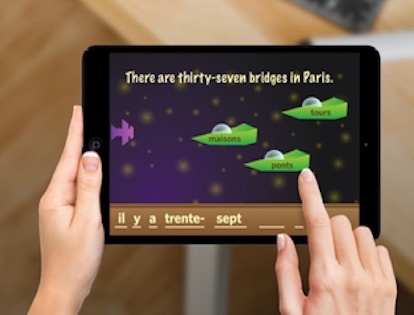Before You Travel: 9 Tips to Boost your Language Skills
 In the fall, we'll be spending two weeks in Bordeaux, France. So, before we get there, I'm super eager to take my French up a notch or two.
In the fall, we'll be spending two weeks in Bordeaux, France. So, before we get there, I'm super eager to take my French up a notch or two.
If I'm an Advanced learner (C1-C2), as I am with French and Dutch, or an Intermediate (B1-B2), as I am with Italian and Spanish, there are many resources to choose from: online programs, books, audio books, Ted talks, TV series, news stories, etc.
If I'm a Beginner (A1-A2) in the language, as I am with Swedish or Portuguese, I look for apps or online programs with words and phrases. Later on I'll start reading simple texts and listen to (slow) audios.
Free options like Duolingo and Lingohut can give you a good start. Others, such as Babbel, Mosalingua, Pimsleur, LingQ, Busuu, etc. also ask you to spend some of your money. (And - if you want to learn/practice polite phrases and greetings just before your next trip to Europe - take a look at Lingo-late.com. More about that below!)
The most important thing to keep me going is to choose interesting materials. I try to do something every day.
Below are 9 Practice Techniques that work for me. They are in no particular order, and I don't do each one every day. I practice a language when I can and feel like it.
1. Listen and Repeat (without seeing the text)
• Focus on the sound of words without visual interference.
• Imitate how words run together in phrases and sentences.
• Practice sentence intonation.
• Notice how the different intonation of sentences can change their meaning.
• Learn to listen for patterns in the language.
Pimsleur Language Programs are a good method for this. We practiced with 90 lessons of Pimsleur Italian before spending 5 months in Rome. I ended up with a pretty good pronunciation and some basic phrases I could use. (But I still had to learn to read Italian and my vocabulary was very limited.)
Later, I used the 'listen and repeat' program, Ripeti con me for Italian. For Spanish, it was the fun app. SuperCoco.
 2. Listen and Read
2. Listen and Read
• Correlate the sound and spelling of words and phrases.
• Become aware of typical letter combinations.
• Notice "silent" letters that are written but not pronounced.
• Look for grammar patterns in the language.
Knowing how written words sound is very helpful for asking directions, for ordering from a menu in a local restaurant, etc.
We had our Pimsleur Italian experience before DuoLingo came out in June 2012. The wish to correlate text and sound digitally for learning a language was the impetus behind GamesforLanguage, which we launched in September 2011. Our courses and games helped me catch up on my Italian reading skills, expanded my vocabulary and kept me in pronunciation practice. They also gave me a good start for Spanish.
DuoLingo Stories are a fun way to read and listen. They started to come out in 2017, and are now available in Spanish, Portuguese, French, and German. You go through the story sentence by sentence. When you click on a word, the English translation comes up.
Olly Richards of IwillteachYouALanguage has a series of Readers with audio in various languages and for different levels. I've been using Spanish and Italian Stories for Intermediate Learners, and now also Swedish for Beginners. Typically, I listen to a story once while following the text. I write down a few key words that I don't know and look them up if I need to. Then I "listen only" to the story several more times.
3. Interactive Play (flashcards and games) 
• Mix it up and add some fun by learning interactively.
• Use flashcards to learn vocabulary and test yourself.
• Build basic language skills for listening, speaking, reading, writing.
• Focus on practicing your pronunciation.
Create a "streak" or build "points" to motivate yourself.Many programs now offer interactive, gamified language learning: DuoLingo, Babbel, Memrise, Busuu, Drops, and yes, GamesforLanguage.
I've used all of these at one time or another, with GamesforLanguage, of course, being my staple. Interactive play doesn't replace having a conversation with a native speaker, but it's a fun way to get in some practice time. It's a great way to learn a language bit by bit.
 4. Read Silently
4. Read Silently
• Practice reading fluently, without stopping if you don't know a word.
• Guess the meaning of words from their context.
• Notice verb tense markers, eg. whether the verb is in the present, past, future.
• Be aware of "who is speaking", as some languages drop pronouns.
Once you are able to read on a high Intermediate level in the language you're learning, there's nothing to hold you back. Reading is a powerful way to acquire new vocabulary and absorb grammar structures intuitively. When you start reading things that really interest you (novels, non-fiction books, news articles), the language is yours.
5. Read Aloud
 • Practice reading aloud fluently, focusing on phrase and sentence intonation.
• Practice reading aloud fluently, focusing on phrase and sentence intonation.
• Pretend you're a native speaker and add some drama to your reading.
• Record yourself and playback.
• Have a native speaker give you feedback (live, or of your recording).
A couple of years back, our French-speaking nephew visited us with his family while we were spending a month in Barcelona. His daughter was four at the time. She asked me to read her a bedtime story in French. It was cute, because like a teacher, she corrected my pronunciation here and there. (My French tends to have a German accent.)
The next day, I noticed that reading aloud had a clear benefit. It made me more confident in speaking French, which in turn improved my fluency.
 6. Listen and Write (dictation)
6. Listen and Write (dictation)
• Learn to identify words by their sound only.
• Produce the spelling of the words and phrases you hear.
• Be aware of word endings, agreement, etc. which may be "silent".
I've always enjoyed practicing a language with dictation. It's very satisfying when you figure out what the sound you hear means and you get the word(s) right.
Producing the written version of words that you hear helps you to remember them better than just reading them.
To practice with dictation, I take an audio that I can easily stop and start again as often as I want. An audio book is perfect for that. I've also used TED and TEDx-talks that are not too long and deal with subjects that interest me.
7. Just Listen (and watch) 
• Get the meaning of each word or phrase through the context.
• Get used to the language spoken at normal speed.
• Pick up everyday conversational phrases.
• Learn the vocabulary around a particular topic.
While driving we often listen to German or French audio books. One we enjoyed was Guillaume Musso's "Fille de papier".
Recently we've also listened to Yuval Harari's Sapiens in French. And while I may not have understood each and every French word, I certainly got the meaning of every sentence. And I'm sure, my vocabulary was further enriched.
 8. Have a Conversation
8. Have a Conversation
• Anxious about having a conversation? Prepare yourself!
• Write down phrases and sentences you think you'll to use, and practice them.
• Look up vocabulary on topics you think may come up.
• Prepare some questions to ask your conversation partner.
All the Listen-and-Repeat or Reading-Aloud practice will help to prepare you for real conversations. Your mouth mechanics will have gotten lots of good practice, so anxiety about pronunciation will be less of an issue.
And don't underestimate the value of talking to yourself in the language you're learning. Have a self-conversation about things you need to do, things you've done, things you notice around you, etc.
9. Write an Email, a Chat Message, keep a Journal
• Try to write fluently, to say what you want to say.
• Then go back and see if you can catch any errors.
• Leave a space for words you're not sure about, then look them up.
• Note words you want to learn in your Vocab Booklet.
It's hard to write spontaneously in a foreign language. Your native language (or another language you're learning) often interferes. Still, if you focus on what you want to say, and not so much on grammar, your writing will make progress. Pretend you're just having a conversation with a (non-critical) friend, and write that way.
I'm not someone who spends hours and hours a day drilling and practicing languages. But I do speak a few languages. I've accumulated these patiently, step by step, always finding fun in learning, and always looking for opportunities to try things out.
I've also found that traveling is a great motivator for learning and practicing a language. Before every trip to a country where I don't speak the language, I spend some time learning useful polite phrases, greetings, numbers, etc.
Greeting people in their local language, thanking them, ordering in a café, asking for directions, these are all ways to show respect for the people whose country or region you are visiting. Just think how you'd feel if the tables were turned.
(In fact, the realization that we can't learn all languages for the European countries we like to travel to, made us start a new site, Lingo-Late.com. Here we've begun to add the 50-100 most useful - “essential”- words and phrases for most European languages. The site is free and you can Listen, Repeat, Record you voice, and Playback any of the phrases.)
